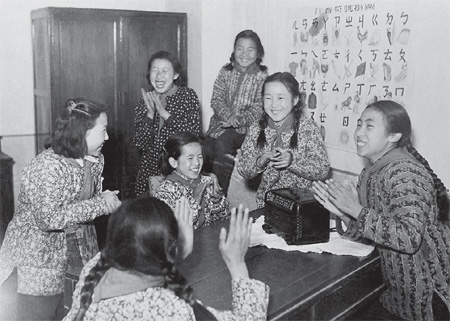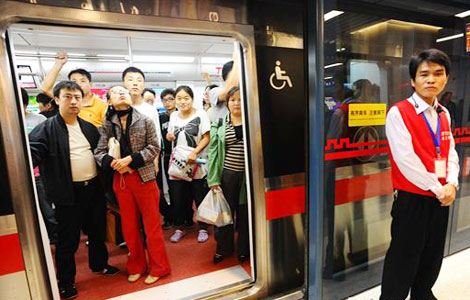Before the microblog, there was radio ...
Updated: 2011-09-18 07:39
By Cang Wei (China Daily)
|
|||||||||||
In China, there is no clearer indication of progress than the rapid changes in the way people stay connected to each other and the outside world. Cang Wei traces the upward curves.
|
 |
|
The simple transistor radio was the only window to the world for many past generations of Chinese, including this group of giggling students. [Provided to China Daily] |
It may seem rudimentary or almost obsolete in today's terms, but decades ago, it was radio that brought the world into Chinese homes. Those days of family and friends crowded around a little transistor radio are still very much part of the indelible memories of several generations.
The first radio station started in Shanghai in 1923, but the years of war and struggle for independence that followed slowed progress, and the medium did not grow much until after 1949, when the People's Republic of China was founded.
At that time, about 80 percent of China's population was illiterate, and radio was the main channel of broadcast. But, in a country of 500 million, there were only 1 million radios, and owning a "secret talking box" became part of common ambition and fashion.
It was more than just a status symbol to own one. It was also the only window to news for many Chinese through the following decades.
Liu Gang, who was a student at Xi'an Jiaotong University in 1964, says he was taking a shower in a public bathroom when he heard through the radio of China's successful nuclear test on Oct 16.
"All the students in the bathroom were jumping for joy and knocking on their wash basins to express their happiness," Liu remembers, smiling.
In the 1970s and '80s, a radio also became part of the requisite purchases for a newly wedded couple and their home. People of that era dreamed of having "three spinning and one resounding" items - a bicycle, a sewing machine, a watch and a radio.
Chen Jian, 51, tells us that when he got married in 1981, he spent his savings buying these four items just to see the smile on his wife's face.
"It always makes me happy to see her happy," he says.
But by then, changes were in the air. With the economic reforms and opening-up policies in the late 1970s and early '80s, radio gradually lost its position to television, although it still retained a tandem role.
For many college students too poor to buy a television, the radio still provided information and entertainment as they tuned in to the BBC and Voice of America to find out what was happening outside China, and at night, they would cluster around the set for cheeky, slightly salacious radio programs.
Television broadcasts began in 1958, but the hardware was still mostly missing. At that time, there were fewer than 100 television sets in Beijing, and as a platform of mass influence, television had limited clout. In contrast, radio was a lot more accessible.
Hot Topics
Organ transplant bonds mother and son
Editor's Picks

|

|

|

|

|

|







